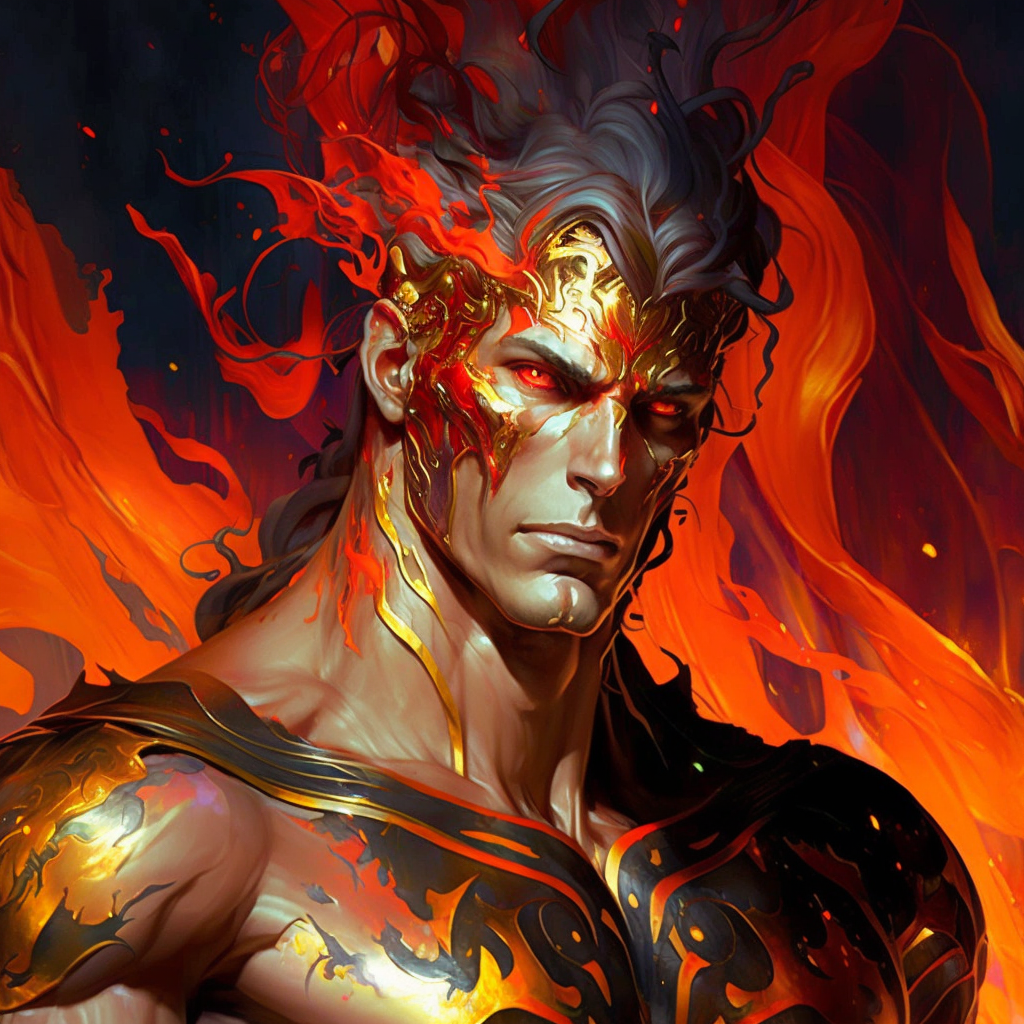Titan, Epimetheus ‘Titan of Afterthought and Regret’
Meet Epimetheus – the impulsive Titan whose one fatal mistake unleashed chaos on humanity!

- Pantheon: Greek Titans
- Deity Title: Titan of Afterthought and Redemption
- Deity Symbol: A broken jar intertwined with shattered chains, representing the consequences of impulsive actions
- Home Plane: The timeless realm of the ancient Titans, bridging mortal affairs and divine retrospection
- Deity Level: Primordial Titan
- Alignment: Chaotic Neutral with a reflective wisdom
- Aliases: The Afterthinker, The Reluctant Mentor, The Impulsive Guardian
- Superior: None; he exists as an equal among the Titans, often contrasted with his brother Prometheus
- Traditional Allies: Prometheus and deities embodying wisdom and learning from the past
- Traditional Foes: Unbridled hubris, unchecked recklessness, and the forces that glorify impulsivity without consequence
- Divine Artifact: The Scroll of Reflections, a mystical parchment that records lessons learned from every rash decision
- Servants: Spirits of Regret and ephemeral echoes of past missteps
- Servitor Creatures: Wandering shadows that embody fleeting thoughts and the remnants of impulsive actions
- Sacred Animal: The stag, symbolizing graceful guidance, introspection, and the pursuit of wisdom
- Manifestations: Epimetheus appears as a time-worn, imposing figure with deep, contemplative eyes and an aura of ancient regret interwoven with hopeful determination
- Signs of Favor: Sudden moments of clarity following rash decisions, reflective dreams, and subtle omens that guide followers away from repeating past mistakes
- Worshipers: Philosophers, impulsive souls seeking redemption, and all who desire to transform mistakes into stepping stones for growth
- Cleric Alignments: Primarily Neutral, with aspects of Chaotic and Lawful Neutral, reflecting the balance between impulsivity and reflection
- Specialty Priests: The Priests of Reflection, known as the Afterthoughts, who counsel others on the transformative power of learning from past errors
- Holy Days: The Day of Afterthought—a time of communal reflection on past mistakes and the promise of redemption through mindful choices
- Portfolio: Impulsiveness, Afterthought, Redemption, and the transformative power of regret and reflective learning
- Domains: Knowledge, Wisdom, and a unique domain of Reflection
- Favored Weapon: A reflective, curved dagger called the Mirror Blade, symbolizing the piercing nature of self-awareness and the ability to confront one’s own flaws
- Favored Class: Cleric or Oracle of Afterthought, chosen for their insight into the consequences of unbridled impulsivity
- Favored Race: Humans, whose capacity for impulsive decisions and subsequent redemption makes them ideal devotees
- Duties of the Priesthood: To guide souls in tempering impulsive actions with reflective thought, to conduct rituals that honor the lessons of regret, and to inspire a legacy of mindful progress
- Major Cult/Temple Sites: Reclaimed ancient temples, secluded groves of reflection, and crumbling sanctuaries in hidden courtyards where the past meets the present
- Benefits: Followers receive moments of profound insight during impulsive times, guidance to avert rash decisions, and a protective influence that nurtures growth through reflective wisdom
- Significant Others: A complex kinship with Prometheus, whose foresight contrasts with his afterthoughts, together embodying the eternal balance between planning and reflection

Epimetheus is a Titan famously known for his impulsive nature and the lack of foresight that sets him apart from his ever-strategic brother, Prometheus. In myth, his most notorious action was accepting Pandora—a seemingly harmless gift from the gods that ultimately unleashed a host of calamities upon humanity. This act, while driven by trust and spontaneity, became a pivotal moment in mythological history, symbolizing the unforeseen consequences of rash decisions.
In a broader context, Epimetheus embodies the inherent tension between impulse and reason. His role in the myths serves as a reminder that even actions taken without premeditation can drastically alter the course of events. His narrative is not solely a tale of caution; it also reflects a deeper philosophical truth about the human condition. Every mistake or impulsive choice carries a hidden lesson, and through these missteps, wisdom can be gained and growth can occur.
Ultimately, Epimetheus hopes to illustrate that while foresight is a virtue, there is value in the lessons learned through afterthought. His story challenges mortals and gods alike to acknowledge that every decision—whether carefully planned or spur-of-the-moment—shapes our destiny. By embracing both the rewards and the consequences of impulsivity, he underscores the idea that even in error, there is potential for enlightenment and personal evolution.
Epimetheus 5e
Epimetheus 5e
Epimetheus 3.5
Epimetheus, the Titan of Afterthought and Regret

Huge Celestial (Titan), Chaotic Neutral
Armor Class 22 (Divine Resilience)
Hit Points 720 (40d12 + 400)
Speed 50 ft., fly 80 ft. (hover)
| STR | DEX | CON | INT | WIS | CHA |
|---|---|---|---|---|---|
| 30 (+10) | 20 (+5) | 30 (+10) | 22 (+6) | 28 (+9) | 26 (+8) |
Saving Throws Str +19, Con +19, Wis +18, Cha +17
Skills History +16, Insight +18, Perception +18, Persuasion +17
Damage Resistances Radiant, Psychic, Thunder, Nonmagical Weapons
Damage Immunities Necrotic, Poison, Bludgeoning, Piercing, and Slashing from non-divine attacks
Condition Immunities Charmed, Frightened, Exhaustion, Poisoned, Stunned
Senses Truesight 120 ft., Passive Perception 28
Languages All, Telepathy 120 ft.
Challenge 28 (120,000 XP)
Divine Traits
Titanic Resilience. Epimetheus has advantage on all saving throws against spells and magical effects. He automatically succeeds on saving throws against effects that would charm, frighten, or force him to act against his will.
Hindsight’s Wisdom. Once per round, if Epimetheus fails a saving throw or attack roll, he may reroll it with advantage, as he retroactively “sees” the mistake he was about to make.
Fated Consequence. If a creature within 120 ft. makes an attack, ability check, or saving throw, Epimetheus can impose disadvantage on the roll as a reaction. If the creature fails, it suffers an additional 4d12 psychic damage as regret floods its mind.
Innate Spellcasting
Epimetheus’s spellcasting ability is Wisdom (spell save DC 26). He can innately cast the following spells, requiring no material components:
At Will: Detect Thoughts, Guidance, Legend Lore, True Seeing, Clairvoyance, Identify
3/Day Each: Modify Memory, Greater Restoration, Divination, Wall of Force, Geas, Confusion, Mislead
1/Day Each: Wish, Foresight, Time Stop, Power Word Heal, Plane Shift, Dream, Reality Break
Actions
Multiattack. Epimetheus makes three attacks: one with his Staff of Regret, one with Reverberating Chains, and one with Hindsight Strike.
Staff of Regret. Melee Weapon Attack: +19 to hit, reach 15 ft., one target.
Hit: 48 (8d8 + 10) force damage, and the target must make a DC 26 Wisdom saving throw or become stunned for 1 minute as visions of past mistakes consume them. The target can repeat the save at the end of each of its turns.
Reverberating Chains. Melee Weapon Attack: +19 to hit, reach 30 ft., one target.
Hit: 42 (6d10 + 10) thunder damage, and the target must make a DC 24 Strength saving throw or be restrained by the divine chains until the start of Epimetheus’s next turn.
Hindsight Strike. Ranged Spell Attack: +18 to hit, range 120 ft., one target.
Hit: 38 (6d8 + 9) psychic damage, and the target must make a DC 25 Intelligence saving throw or suffer disadvantage on all attack rolls and ability checks for 1 minute as they hesitate, reliving their previous failures.
Legendary Actions
Epimetheus can take three legendary actions, choosing from the options below. Only one legendary action can be used at a time, and only at the end of another creature’s turn. He regains spent legendary actions at the start of his turn.
Regret’s Weight. Epimetheus forces one creature within 120 ft. to make a DC 25 Charisma saving throw. On a failure, they take 6d12 psychic damage and are stunned until the end of their next turn.
Echo of the Past. Epimetheus teleports up to 60 feet to an unoccupied space he can see and casts Modify Memory on a creature within range.
Divine Reflection (Costs 2 Actions). Epimetheus perfectly mirrors an attack or spell that targeted him, directing it back at its caster or attacker.
Lair Actions (If in a Place of Divine Power)
On initiative count 20 (losing initiative ties), Epimetheus takes a lair action to cause one of the following effects:
- Memories of Failure. All creatures of Epimetheus’s choice in the lair must make a DC 24 Wisdom saving throw or suffer disadvantage on their next attack roll, as painful memories of past failures haunt them.
- Shattered Time. Time fractures for Epimetheus and his allies. Each can take an additional action or move half their speed without provoking opportunity attacks until the next initiative count 20.
- Visions of What Was. Epimetheus calls upon his power of afterthought. One enemy of his choice must repeat the last action they took on their previous turn.
Divine Artifacts
Staff of Regret. This celestial weapon allows Epimetheus to channel divine hindsight. When wielded by him, it amplifies his ability to see the consequences of actions before they unfold, granting him his Hindsight’s Wisdom ability.
Reverberating Chains. Forged from the remnants of the chains used to bind Prometheus, these divine bindings echo the mistakes of the past. They can restrain even the strongest foes, their power tied to the weight of history itself.
Regional Effects (If He Remains in an Area for Long Periods)
- People experience vivid dreams of past choices, sometimes revealing hidden truths or unseen consequences of their decisions.
- In a 1-mile radius, creatures gain +5 to Insight checks but disadvantage on Initiative rolls, as their minds linger on reflection instead of immediate action.
- Ancient ruins or forgotten temples nearby become clearer, as if time rewinds slightly, revealing secrets lost to history.
Tactics & Roleplaying Notes
Epimetheus is not a god of war but a god of wisdom gained through experience. He fights reactively, countering attacks, punishing reckless decisions, and forcing enemies to relive their mistakes. He rarely attacks first, instead observing before stepping in to alter the course of battle. His goal is not destruction, but enlightenment—even if that means making enemies suffer the weight of their own failures before they truly understand their consequences.
Epimetheus, Titan of Afterthoughts

Huge giant (titan), chaotic neutral
Armor Class 22 (natural armor)
Hit Points 700 (30d12 + 150)
Speed 60 ft., climb 40 ft.
STR 30 (+10) DEX 18 (+4) CON 20 (+5) INT 16 (+3) WIS 16 (+3) CHA 22 (+6)
Saving Throws Str +18, Dex +12, Con +14, Wis +11, Cha +16
Skills Athletics +18, Insight +11, Intimidation +16, Perception +11
Damage Resistances cold, fire, lightning; bludgeoning, piercing, and slashing from nonmagical weapons
Senses truesight 120 ft., passive Perception 21
Languages Common, Giant
Challenge 25 (75,000 XP)
Legendary Resistance (3/Day) If Epimetheus fails a saving throw, he can choose to succeed instead.
Titanic Regeneration. At the start of each of Epimetheus’s turns, he regains 30 hit points.
Magic Resistance. Epimetheus has advantage on saving throws against spells and other magical effects.
ACTIONS
Multiattack. Epimetheus can use his Frightful Presence. He then makes two Slam attacks.
Slam. Melee Weapon Attack: +18 to hit, reach 15 ft., one target. Hit: 30 (4d10 + 10) bludgeoning damage.
Thunderous Stomp (Recharge 5-6). Epimetheus slams his foot onto the ground, creating a shockwave that deals thunder damage to all creatures within 60 feet of him. Affected creatures must make a DC 25 Constitution saving throw or become stunned until the end of their next turn. On a successful save, creatures take half as much damage and are not stunned. Area of Effect: all creatures within 60 ft. of Epimetheus. Damage: 60 (10d10) thunder damage.
Frightful Presence. Epimetheus lets out a terrifying roar. Each creature within 120 feet of Epimetheus and aware of him must succeed on a DC 23 Wisdom saving throw or become frightened for 1 minute. A creature can repeat the saving throw at the end of each of its turns, ending the effect on itself on a success.
LEGENDARY ACTIONS
Epimetheus can take 3 legendary actions, choosing from the options below. Only one legendary action option can be used at a time and only at the end of another creature’s turn. Epimetheus regains spent legendary actions at the start of his turn.
Slam. Epimetheus makes one Slam attack.
Roar. Epimetheus lets out a thunderous roar. Each creature within 60 feet of Epimetheus and aware of him must succeed on a DC 23 Wisdom saving throw or become frightened for 1 minute. A creature can repeat the saving throw at the end of each of its turns, ending the effect on itself on a success.
Dismantle Reality. Epimetheus tears a hole in reality, causing all creatures within 30 feet of him to make a DC 25 Constitution saving throw. On a failed save, creatures take 50 (10d10) force damage and become stunned until the end of their next turn. On a successful save, creatures take half as much damage and are not stunned. Area of Effect: all creatures within 30 ft. of Epimetheus. Damage: 50 (10d10) force damage.
Lair Actions
On initiative count 20 (losing initiative ties), Epimetheus can take a lair action to cause one of the following effects. Epimetheus can’t use the same effect two rounds in a row:
- Shake the Ground. Epimetheus slams its greatclub into the ground, causing the entire lair to shake. Each creature on the ground within 120 feet of Epimetheus must make a DC 24 Dexterity saving throw or be knocked prone.
- Boulder Barrage. Epimetheus hurls a barrage of boulders from the walls and ceiling of the lair. Each creature in the lair must make a DC 24 Dexterity saving throw or take 35 (10d6) bludgeoning damage.
- Reshape the Lair. Epimetheus alters the layout of the lair, causing walls and pillars to shift and move. All creatures within 60 feet of Epimetheus must succeed on a DC 24 Dexterity saving throw or take 24 (7d6) bludgeoning damage and be moved 10 feet in a random direction. The affected area becomes difficult terrain until the end of the next turn.
Equipment
- Greatclub: Melee weapon attack, reach 15 ft., one target. Hit: 32 (4d10 + 10) bludgeoning damage.

Epimetheus is a towering 25-foot titan with rocky skin and a muscular, sturdy build. His eyes radiate power, and his hair is a fiery mix of red and yellow flames. He wears golden plates on his body, and his clawed hands could easily crush boulders. When he moves, the ground trembles, and his deep voice rumbles like thunder. His presence inspires both awe and terror, making even the bravest of warriors cower.
- Pantheon: Greek
- Deity Title: Titan of Afterthoughts
- Deity Symbol: A boulder or mountain peak
- Home Plane: Olympus
- Deity Level: Greater Titan
- Alignment: Chaotic Neutral
- Aliases: Afterthinker, Regretful One
- Superior: Kronos (father)
- Traditional Allies: Other Titans, some primordial gods
- Traditional Foes: Olympian gods, especially Zeus
- Divine Artifact: The Crown of Epimetheus, which grants the wearer the ability to perceive all possible outcomes of a given situation, and choose the most favorable one.
- Servants: Lesser Titans, giant kin, some mortals
- Servitor Creatures: Ravens, wolves, and golems made of stone or metal
- Sacred Animal: Hawk
- Manifestations: Sudden changes in the weather, unexplained sounds, intense emotional states
- Signs of Favor: A sudden increase in intelligence or insight, favorable winds, sightings of hawks
- Worshipers: Philosophers, scholars, inventors, those seeking insight and foresight
- Cleric Alignments: Chaotic Good, Chaotic Neutral, True Neutral, Chaotic Evil
- Specialty Priests: Oracles, Prophets, Seers
- Holy Days: The Festival of Epimetheus (held on the summer solstice), The Night of Regrets (held on the winter solstice)
- Portfolio: Foresight, hindsight, regret, memory, invention
- Domains: Knowledge, Trickery, Life
- Favored Weapon: Quarterstaff
- Favored Class: Sorcerer
- Favored Race: Human
- Duties of the Priesthood: Seeking and interpreting signs, recording and preserving knowledge, offering counsel and guidance
- Major Cult/Temple Sites: The Temple of Epimetheus in Athens, Greece; The Oracle of Epimetheus in Delphi, Greece
- Benefits: Those favored by Epimetheus may gain great insight and foresight, as well as the ability to undo past mistakes or rectify past regrets. They may also receive sudden bursts of inspiration or invention, as well as the ability to see through deceptions and illusions. Those who serve as priests or devotees of Epimetheus may gain increased intelligence or wisdom, as well as access to rare knowledge and the ability to communicate with the Titan himself.
Brother to Prometheus, Atlas, and Menoetius, Epimetheus was always most closely linked to Prometheus because of their names. His name means “hindsight” while Prometheus means “foresight,” making him the dimmer of the two. It is Epimetheus who takes in Pandora, despite Prometheus‘s warnings, and as a result mortals are forever plagued with problems.
This colossal humanoid bears a pleasant, tranquil countenance. He dresses finely, but his clothes are somewhat disheveled. His eyes seem vacant, as if in a daydream.
Epimetheus is a clumsy titan, though he is friendly and means well. His name means “afterthought,” or “hindsight,” and was given to him to suggest that he does not always think before he acts. He is the son of the Titan Iapetus and the nymph Clymene, and is the brother of the Titans Prometheus and Atlas. Though often seen as a bumbling fool, Epimetheus has an equal fondness for humans as his brother Prometheus’, and he always means well.
Epimetheus was charged with the responsibility of giving a positive trait to every animal. But when it was time to give one to humans he had already used up all the traits, so his brother Prometheus (who felt that humans deserved to have something that no animal possessed) stole fire from Zeus to give as a gift to humankind. As a punishment for Epimetheus’ poor planning Zeus created Pandora, the first woman, and gave her to the foolish Titan as a wife.
Though Prometheus, who had his own punishment to serve for stealing the fire, warned his brother not to trust any gift from the Olympian gods, Epimetheus fell in love with and accepted Pandora despite the warnings. Epimetheus took Pandora as his wife, and they had a daughter Pyrrha, who married her cousin Deucalion. These two humans were the only survivors of the Great Deluge that Zeus sent to destroy the Golden Age.
When the Olympians were finished creating Pandora, the trickster god Hermes presented her with a special box and warned her not to open it. Pandora was made to be curious however, and eventually Epimetheus foolishly allowed her to open the box. The opening of this box released all kinds of misfortunes upon mankind, ruining their idyllic existence, though Pandora was able to close the box just in time to leave humans with a sense of hope in times of evil.
Titan, Greater, Epimetheus
Originally Posted by BOZ of the En World forums.
| Titan, Greater, Epimetheus | |
| Colossal outsider (Chaotic, Extraplanar, Good) | |
| Hit Dice | 40d8+640 (820 hp) |
| Initiative | +6 |
| Speed | 60 ft (12 squares) |
| Armor Class | 41 (-8 size, +6 Dexterity, +33 natural), touch 8, flat-footed 35 |
| Base Attack/Grapple | +40/+75 |
| Attack | Slam +51 melee (7d10+19) |
| Full Attack | 2 slams +51 melee (7d10+19) |
| Space/Reach | 30 ft/30 ft |
| Special Attacks | Spell-like abilities, spells |
| Special Qualities | Clay of creation, damage reduction 15/epic, Darkvision 240 ft, Spell Resistance 36 |
| Saves | Fort +42 Ref +28 Will +35 |
| Abilities | Strength 48 Dexterity 23 Constitution 43 Intelligence 34 Wisdom 37 Charisma 30 |
| Skills | Balance +45, Bluff +39, Climb +58, Concentration +52, Craft (sculpting) +68, Decipher Script +47, Diplomacy +43, Disguise +10 (+12 acting), Gather Information +39, Handle Animal +48, Heal +42, Intimidate +48, Jump +68, Knowledge (Arcana) +51, Knowledge (nature) +53, Knowledge (religion) +48, Knowledge (the planes) +41, Listen +42, Perform (comedy) +45, Perform (oratory) +39, Perform (sing) +39, Ride+10, Search +41, Sense Motive +27, Spellcraft +53, Spot +42, Survival +52 (+54 following tracks, +54 aboveground, +54 on other planes), Swim +48 |
| Feats | Animal Affinity, Craft Wondrous Item, Empower Spell-Like Ability (cure critical wounds), Power Attack, Quicken Spell-Like Ability (greater teleport), Skill Focus (Craft [sculpting]), Track |
| Epic Feats | Craft Epic Wondrous Item, Epic Fortitude, Epic Skill Focus (Craft [sculpting]), Improved Darkvision, Legendary Climber , Legendary Leaper, Legendary Tracker |
| Environment | |
| Organization | Solitary |
| Challenge Rating | 27 |
| Treasure | Double standard |
| Alignment | Always chaotic good |
| Advancement | — |
| Level Adjustment | — |
- Epimetheus has no set home, and usually wanders the plane of Bytopia lost in his thoughts.
- Epimetheus is 100 feet tall and weighs 725,000 pounds.
- Epimetheus speaks Abyssal, Common, Celestial, Draconic, Giant, and Sylvan.
COMBAT

Epimetheus usually avoids combat, but if drawn into battle through challenge or if animals or innocent creatures are in danger, he joins the fray. Epimetheus uses his spells and spell-like abilities to summon animals and aid them in battle, while battering adversaries with his massive fists.
Epimetheus’s natural weapons, as well as any weapons he wields, are treated as epic weapons for the purposes of overcoming damage reduction.
Spell-Like Abilities: At will – animal messenger, animal trance (DC 22), calm animals (DC 21), chain lightning (DC 26), charm animal (DC 21), charm monster (DC 24), cure critical wounds (DC 24), daylight, detect animals or plants, fire storm (DC 27), greater dispel magic, Hold monster (DC 25), holy smite (DC 24), invisibility, Invisibility Purge, levitate, Neutralize poison, persistent image (DC 25), polymorph (humanoid forms only, duration 1 hour), protection from energy, read magic, remove curse (DC 23), remove disease (DC 23), speak with animals;
3/day – etherealness, freedom of movement, greater teleport, summon nature’s ally IX, word of chaos (DC 27);
1/day – Awaken (DC 25), gate, greater restoration, maze, meteor swarm (DC 29), plane shift, regenerate (DC 27), Reincarnate, wind walk.
Caster level 25th. The save DCs are Charisma-based.
Spells: Epimetheus can cast divine spells as a 10th-level druid. The save DCs are Wisdom-based.
Typical druid Spells Prepared (6/8/7/6/6/5; save DC 23 + spell level):
- 0 – Create Water, Detect Magic, Detect Poison, Know Direction, mending, Purify Food and Drink;
- 1st – detect animals or plants, entangle, faerie fire, Goodberry, longstrider, pass without trace, produce flame, speak with animals;
- 2nd – barkskin, gust of wind, heat metal, soften earth and stone, Spider Climb, summon swarm, warp wood;
- 3rd – call lightning, meld into stone, quench, remove disease, water breathing, Wind Wall;
- 4th – air walk, flame strike, freedom of movement, ice storm, rusting grasp, scrying;
- 5th – Awaken, commune with nature, control winds, death ward, transmute mud to rock.
Epimetheus can also cast arcane spells as a 15th-level sorcerer (6/9/9/8/8/8/8/5; save DC 20 + spell level).
He has access to the following spells:
- 0 – arcane mark, dancing lights, ghost sound, mage hand, mending, message, open/close, prestidigitation, resistance;
- 1st – expeditious retreat, grease, Jump, floating disk, True Strike;
- 2nd – Cat’s Grace, fog cloud, Fox’s Cunning, Mirror Image, touch of idiocy;
- 3rd – displacement, fly, haste, slow;
- 4th – arcane eye, confusion, scrying, stone shape;
- 5th – baleful polymorph, fabricate, major creation, transmute rock to mud;
- 6th – flesh to stone, greater heroism, true seeing;
- 7th – banishment, mass hold person, statue.
The save DCs are Charisma-based.
Clay of Creation (Su): At will, as a full-round action, Epimetheus can shape clay into the form of any living non-unique creature that is not of extraplanar origin. The sculpture becomes a living creature with average statistics for its type. This creature will serve him until it dies, though Epimetheus usually sets it free after a specific service.
Epimetheus can control only 50 HD worth of such creatures at a given time. If he exceeds this number, all the newly created creatures fall under his control, and any excess creatures from previous castings become uncontrolled. (Epimetheus chooses which creatures are released.)
Epimetheus may also create a ball of clay, at will, as a full-round action, to give to another character. The character may activate the clay at any time by tossing the ball to the ground. The clay will instantly take the form of any creature of 4 Hit Dice or less that the character desires, as described above. This creature will serve the character until it dies, or until the character sets it free.
Something about Epimetheus’ clay makes the creatures unstable sometimes. Any creature that Epimetheus makes for himself may go berserk at the moment of its creation if he does not succeed on a DC 44 Will save. The uncontrolled creation goes on a rampage, attacking the nearest living creature or smashing some object smaller than itself if no creature is within reach, then moving on to spread more destruction. Once a creation goes berserk, no known method can reestablish control. A creature created from a ball of clay has a 60% chance of going berserk at the moment of its creation.
Originally found in the first edition Deities and Demigods (1980, James M. Ward and Robert J. Kuntz).
Currently in the World
Epimetheus walks through the medieval world, his ancient presence a quiet counterpoint to the ever-shifting tapestry of human ambition and creativity. In a forgotten courtyard framed by weathered stone arches, he pauses to trace the echoes of his own impulsive past, the scars of bygone mistakes etched in the very fabric of these ruins. The chill of early morning mist mingles with the warm glow of emerging ideas as he moves along narrow cobblestone streets, where merchants haggle over exotic spices and artisans display intricately carved wares.
At a lively open-air forum, a group of scholars debates the merits of new scientific discoveries and philosophical musings. Epimetheus listens intently, his deep-set eyes reflecting the light of a distant past while absorbing the fervor of the present. He steps forward, his voice steady and resonant, offering reflections born from centuries of experience. “Every misstep is but a stepping stone toward wisdom,” he intones, sparking quiet nods among the gathered thinkers. His words, laced with the weight of ancient myth, blend seamlessly with the vibrant dialogue of this dynamic era.
In bustling market squares, he finds himself sharing moments with everyday people—merchants, travelers, and craftsmen—whose lives are a delicate balance of risk and reward. Over cups of spiced tea served in humble taverns, he recounts tales of impulsivity and its unforeseen consequences. In these exchanges, his motivation becomes clear: to illuminate the path from reckless action to deliberate reflection. Epimetheus believes that by understanding the true cost of hurried decisions, people can learn to temper their impulses with insight, thus ensuring a legacy of thoughtful progress.
As twilight descends, Epimetheus retires to a modest study tucked away in a quiet alley, its walls lined with scrolls and ancient maps. Here, by the flicker of a single oil lamp, he records his observations in a weathered journal. Each entry is a meditation on the intricate interplay between destiny and choice—a guide for future generations on navigating the labyrinth of their own lives. His goal remains steadfast: to transform the raw energy of impulsivity into a beacon of reflective learning.
Throughout his journey, Epimetheus interacts with a world in flux, one that mirrors his inner struggle to reconcile past regrets with the promise of future wisdom. Amid vibrant celebrations, heated debates, and quiet moments of introspection, he carves out a legacy not defined by his earlier missteps but by the transformative lessons they inspire. In every encounter, he hopes to kindle a spark of caution and understanding, encouraging each soul to look beyond the immediate and embrace the deeper narrative of growth and renewal.

 Buy me a coffee
Buy me a coffee